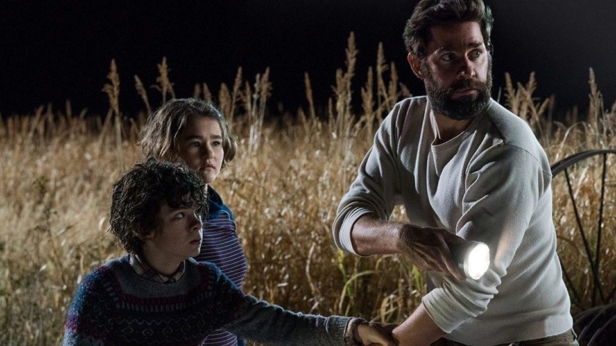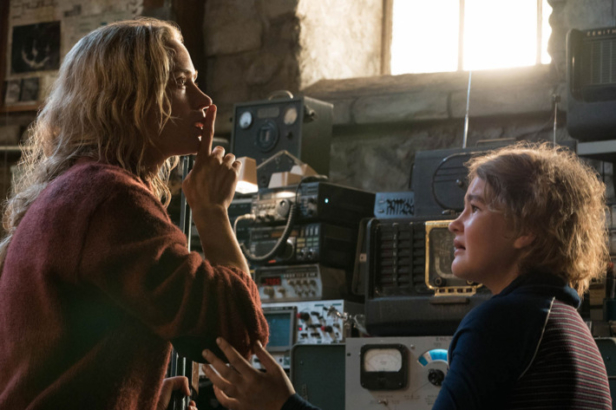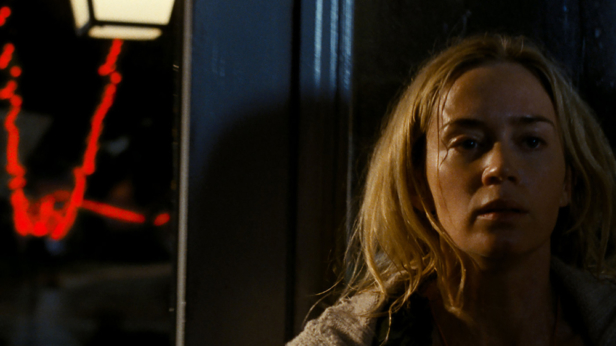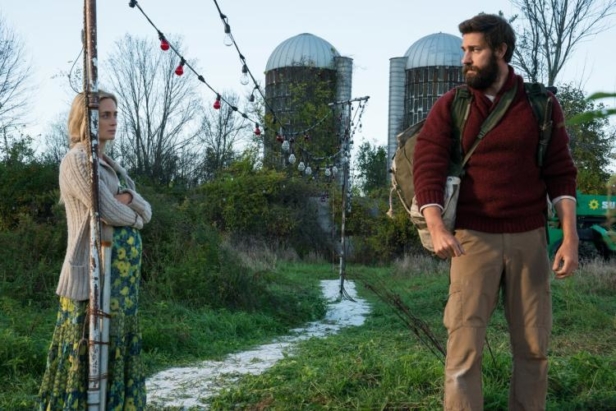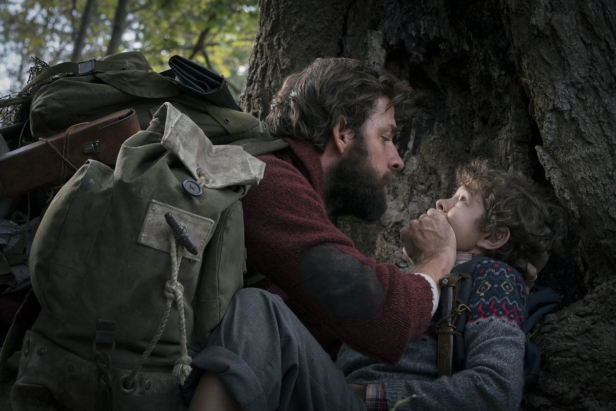“If you’d have told me two years ago that I’d be directing a horror movie, I would have told you that’s insane because I can’t watch horror movies,” laughs John Krasinski. But here we are, and the star of The Office and Jack Ryan has delivered a very scary and incredibly tense horror film with his third directorial effort: A Quiet Place.
He and real-life spouse Emily Blunt play parents attempting to keep their family safe from creatures that have decimated the human race, using their incredible hearing to stalk and kill their prey, and we talked to Krasinski about overcoming his fear of horror movies, working with his spouse, and why the genre is on the cutting edge.
So, given that you can’t watch horror movies, what was it about A Quiet Place that appealed to you?
I had just signed on to the show Jack Ryan and one of the producing groups is Platinum Dunes, and they said “Would you ever be interested in acting in a genre film?” I said “I just don’t do scary movies but if it was a cool idea, yeah, if it’s something I could connect to maybe I’d think about it.” “It’s about a family that can’t speak, and you have to figure out why,” and I said “Damn you! That’s one of the best one-liners I’ve ever heard!”
So, they had a spec script that was obviously an early draft of an idea, and I read that, and the script wasn’t quite there but the idea really was. Bizarrely, we had just had our second daughter a few weeks earlier so I was right in the eye of the storm of new dad days. So, I was already filled with dread and terror and insecurities and fear of keeping my child safe and being a good dad. I think there’s no better audience or person to connect to this spec than me. And when I read this script, the idea really moved me and I saw it as…yes, it should be a scary movie, but the thrust shouldn’t be a scary movie, what if the thrust was the best metaphor for parenthood that you can get? So, I called the producers back and said “I will star in this if you let me re-write and direct it,” and they said “Yeah.”
So the family element was absolutely crucial for you?
Yeah, absolutely. I think family, especially in this day and age, is the most important thing. With the intensity that’s going on in the world, I think that we’re not really designed to deal with things alone. It’s nice to have someone to talk about it with or even more importantly rely on. So that dynamic and that grouping was something that I really thought about here.
Emily and I were in the first few weeks of our child being here, obviously discussing things like keeping her safe and keeping her alive, is she breathing in the crib and all that stuff, and here I was reading about parents having the same conversations just with much more heightened stakes. And I immediately connected to that and I thought that’s something that every parent feels. Certainly not that creatures are going to come out of the woods and kill your kids, but the fear is that something out there will get your kid. And your biggest fear as a parent is one day letting your kid experience the world without you, and I thought that’s a really beautiful thing that I connected to immediately.
It’s funny, I learned this thing on The Office years ago, I remember a writer saying to me, “Your job is not to deliver the line funny, your job is just to deliver the line, and whether or not the people at home find it funny is up to them.” Because they might find it funny or they might cry based on your relationship with the receptionist or something. So, when I went into this script I tried not to look at it as I was writing or directing something scary. I tried to look at it as write an honest interpretation of what a family going through something this intense would be, and if people find it scary hopefully they find it scary because they don’t want anything to happen to this family.
As someone who doesn’t like being scared, was it fun crafting the scares, thinking “this is going to terrify people”?
These producers at Platinum Dunes have produced a bunch of horror films before like The Purge and Ouija and all that stuff, so they were sort of my barometer for what’s scary but the good news is, as someone who doesn’t see a lot of horror movies and gets scared easily, I have to say I was my own good barometer too! Because when we were designing shots and even when you saw there’s a storyboard or something, you’d say “I don’t know, that might scare the crap out of people!” So, you had a good barometer there.
With this movie I was trying to make a much more classic version of a genre movie or a thriller. Because I hadn’t seen so many of the modern really really scary movies I went back to Jaws and Alien and all the Hitchcock stuff, and that stuff’s a little more slow-burn and a lot more character driven so I was really interested in that idea. It’ll definitely scare you, but it’ll scare you for all the right reasons rather than people’s faces getting ripped off.
How intimidating was it to approach a film that’s essentially dialogue-free for the most part?
Oh my god, it was terrifying. In its original state when I was thinking about it, I was so scared I had to dissociate myself from what would be scary or what people would want to see and you start really just focusing on the family. One of my favourite moments in the process was the first time Emily saw a cut of the movie. I immediately dove into “Does this scene work and does this scene work and does this make sense?” and she said “Hold on, hold on a second, you directed a silent movie!” And I thought yeah, wow that’s pretty cool! I hadn’t realised, I was so focused on other things and she was like “You pulled it off, that’s so cool!” Because we were signing and things like that, we felt like there was dialogue or something and then you see it on screen and you’re like “Whoa, no one has spoken yet!” And it’s pretty cool.
At what point did you realise that you wanted Emily Blunt to star in the film?
Great question, truth is: she wasn’t supposed to be part of the film ever! I basically pitched her the idea that I had of the rewrite and what I wanted to do to the script and how I wanted to rewrite it, and yet again all good things that have happened to me since I met my wife come from my wife, but she said, “You should direct it.” I thought, “Oh, I don’t know, I have this idea, I want to do the rewrite for the thing that I act in,” and she was like, “No, I’ve never seen you this excited, you seem really connected to it, you should direct it.”
So that’s phase one. And then writing is a very intimate thing where you don’t want everybody to read your piece until it’s done so she read a scene here or there, but she was so supportive, in fact she started giving me names of other actresses that based on my ideas would be great for the role! Now, it’s not because I didn’t want her in the role, obviously secretly I always wanted her in the role, we’ve always talked about working together, but we were always scared of what would be the right project to work together on because we never wanted the story of our marriage to precede whatever story was in the movie. And this story is so specific and so out there that I don’t think anything can supersede this story, it’s its own unique thing.
We were flying to LA and she said “Is the script in a place where you’re cool with me reading it?” and I said “Yeah, sure.” And I gave her the script and she turned to me after reading it and at first, I thought she was sick but before I could reach for a barf bag, she said, “You can’t let anyone else do this role.” And I said, “What?” because I couldn’t really believe what I was hearing, and she said, “I have to play this part, I need to play this part.”
And at the risk of sounding overtly adorable or something, it’s true, it was the greatest moment of my career. I’m not exaggerating when I say that because not only because my wife who I love and respect wanted to do the movie, but this actress that I have watched how she chooses roles and how committed she is to these projects, she has the most amazing set of instincts, the most amazing decision making process, so I knew her decision had very little to do with me and had everything to do with the part. Because if it had to with me and doing a favour for me, we would have ended up in a bad place and we both knew that. So, the fact that she loved the script, that she knew how to play this part is the best thing you can have any actor sign on for.
How did you find the process of working together?
It’s funny because the night before we started working, she actually turned to me and said “Are you nervous?” and, honestly, I said, “I’m terrified,” and she said, “Oh thank God, me too!” We had heard from so many people, “Oh man, you’re working with your wife? That’s going to be impossible, good luck, you’ll never make it through!” We were getting these very heavy warnings. And instead we decided to just take it one day at a time. Instead of saying “This is going to be the greatest experience of our lives or the worst experience of our lives,” we were like “Let’s just see how it goes day by day.”
We each have our own process and I think we were worried that our processes would get in the way of each other. And instead I watched her be obviously an incredible actress, but she was also the most respectful, respected, kind, prepared person you could ever want on a set. She ended up giving me amazing ideas on the script, amazing ideas for shots, fully supportive. So, it’s the best experience I’ve ever had as far as a collaborator, truly the best experience I could have in any collaborator let alone someone so personally involved with.
I remember I was picking out an editing bay the week before we started shooting and Rob Marshall was editing Mary Poppins nearby. So, he had just worked with Emily and he said “When do you guys start shooting?” I said, “Next week,” and he said, “Oh I can’t wait, you’ll see.” And I said, “Yeah, I know, I’m such a huge fan of my wife’s, I can’t believe that I’m going to do it.” And he said, “No, no, no, you’ll see.” And I remember thinking that was odd, so I said, “Yeah, she’s great.” And he said, “No no no, not until you’re in the room where she does what she does, will you fully understand how good your wife is.”
And I thought what an amazing compliment from such a great director, but then I thought well I’m a big fan of all the movies I see of hers, and then in the moment, day two I think it was, she did one of the most emotional scenes which is in the trailer, the bathtub scene, and I promise you, she only did one take. She did this scene and the entire crew, it looked like we had all frozen. None of us spoke and you can actually hear on the dailies the long pause and then I go: “Alright, let’s go to lunch!” Everyone was just sitting staring at her, holding microphones and cameras like what just happened! So, Rob Marshall was right, I never knew I would feel that level of respect and admiration for her.
This isn’t your first time as an actor-director, is that a combination you find easy?
Well, I mean the hardest part is working with a diva like me. So, I had to sort of reconcile that amongst myself! I’m kidding, I actually find it an incredible benefit to act in the movie that you’re directing. It’s really simply for the process, because as the director’s sitting behind the monitor and calling cut and then going in and giving your actors notes, you really do break the flow of what is being conjured on set. Being able to be in that set and in that bubble of whatever’s being created is actually extremely helpful.
So, instead of saying cut and coming in and giving notes, I could actually just say under my breath while keeping the cameras rolling, “Let’s try this again,” or “That was really great, is there anything else you want to do there?” Something like that and it actually sometimes just felt more like a play. Like we were all in a moment that when we called cut and it was over everybody felt good about it.
You mentioned Jaws and Alien and Hitchcock. Did you do any recent horror movie research for A Quiet Place?
Oh, absolutely. As someone who can’t do scary movies, I had to start watching scary movies, and you have to watch everybody else’s technique and fall in love with all these shots and see the masterful work that everybody’s doing. I’ve always had this sense, or at least when I was growing up, that horror movies were maybe not as high quality art but really entertaining and that’s completely not true at all.
I mean, genre movies nowadays usually have some of the most highly accomplished visuals and directing and acting and all that stuff. Look at Get Out being nominated for an Oscar [this interview was conducted before the Oscars took place, before Get Out‘s win for Best Original Screenplay]. It’s such an incredibly exciting time, because here I was, terrified to watch all these movies as research and instead I watched all these movies like It Follows, Don’t Breathe, Get Out, The Witch, The Babadook, all these movies that I got exposed to, and it felt like I wasn’t watching scary movies, I was watching these incredibly well-crafted movies that happened to be scary.
So, now that you’ve done your horror film, are you also done with watching horror?
Oh my god, absolutely not. I definitely now see the validity and the power of horror movies. I just feel sheepish and embarrassed that I’m late to the party. You guys who are fans of horror movies have been on the cutting edge of what’s cool, so I’m joining the party late but I’m happy to be here.
A Quiet Place is in cinemas now. Read our review here.
